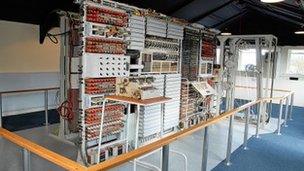Wartime diary helps to tell Colossus story
- Published

A wartime diary that helps to fill out the history of a pioneering computer called Colossus will soon go on display at Bletchley Park.
The diary was written by Post Office engineer Tommy Flowers who designed the codebreaking machine.
The secrecy surrounding Colossus meant Mr Flowers' position in the history of computers has been overlooked.
First switched on in 1943, Colossus is now acknowledged as being the world's first electronic, digital computer.
Colossus was built during World War II to decrypt the high-level messages sent between Hitler and his generals. The intelligence received from the messages is thought to have shortened the conflict by two years and saved many lives.
However, the secrecy surrounding Colossus meant that the contribution it made to the war, and the work of its creators was overlooked for decades.
The National Museum of Computing (TNMOC) at Bletchley Park, Buckinghamshire, has been at the centre of efforts to fill the gap and ensure the full story of wartime computer development is told.
'No fuss'
Now the museum has secured access to the 1944 diary of Tommy Flowers that records some of the steps he took to create Colossus. Excerpts from the diary, and some of his other personal effects, will soon form part of an interactive display in the museum's Colossus gallery which is currently in the middle of a refit. The refit is due to be finished later this year.
"Tommy Flowers is an important and integral part of the Colossus story," said Andy Clark, head of the Trustees at TNMOC. "We've been given access to some of Tommy Flowers' personal items and we want to curate them properly so the whole story is told."
Mr Clark said the diary was a charming mix of the monumental and mundane. One page might mark key moments in Colossus' creation, he said, and the next would record a Flowers family outing to the pantomime.
Kenneth Flowers, son of the pioneering engineer, said he was glad that his father's contribution to the history of computers was gradually getting more recognition.
He said he knew that his father worked on secret projects during the war but had no sense until much later of how important it had been.
"He really made no fuss about it," he said.
- Published8 May 2012
- Published9 March 2012
- Published19 June 2012